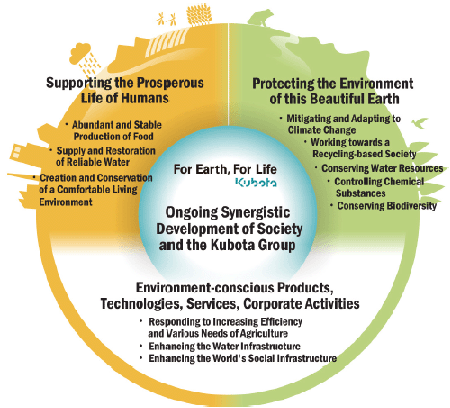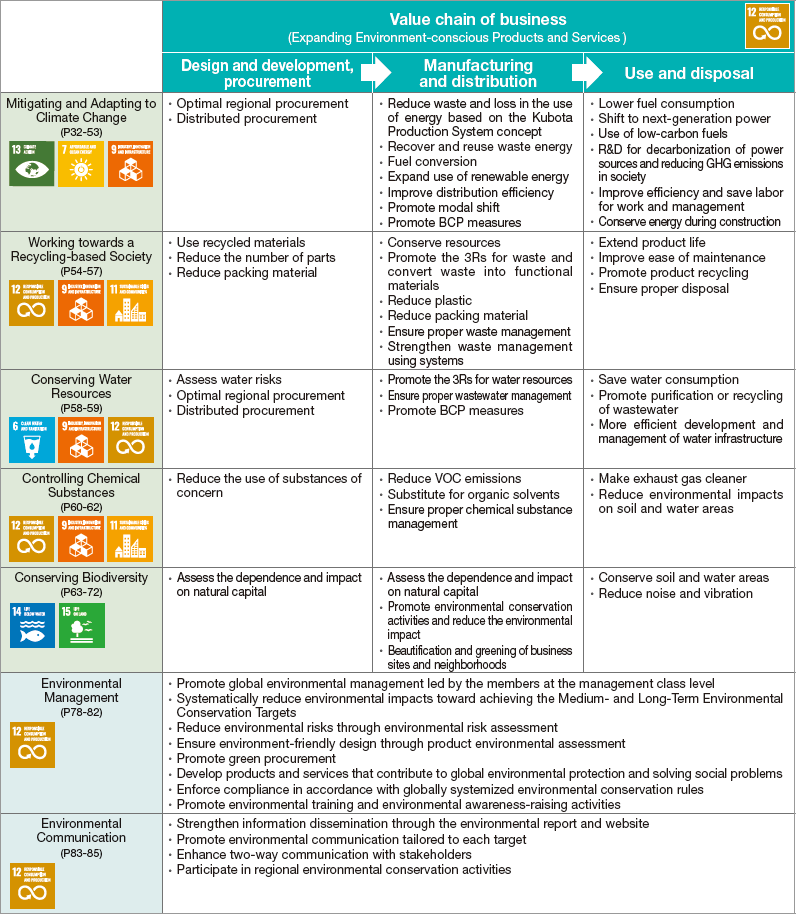Environmental Management Basic Policy
Today we face various environmental problems. Many environmental problems, from those unique to each region to those on a global scale, exist around the world. As they are complexly intertwined and continuing to deteriorate, achieving a sustainable society is a global common challenge. Companies are expected to play an increasingly larger role in tackling this challenge.
Since the time of its foundation, the Kubota Group has pursued a mission of solving social problems in developing its businesses. Toward the realization of “For Earth, For Life,” the Kubota Group will contribute to the realization of a sustainable society through its environmental management initiatives.
- The Kubota Group Environmental Charter
- The Kubota Group Environmental Action Guidelines
- Message from the Environmental Conservation Control Officer
- Environmental Management Approach
The Kubota Group Environmental Charter
- The Kubota Group aspires to create a society where sustainable development is possible on a global scale.
- The Kubota Group contributes to the conservation of global and local environments through its environmentally friendly operations, products, technologies, services, and corporate activities.
The Kubota Group Environmental Action Guidelines
- Environmental Conservation Efforts in All Business Activities
- We promote environmental conservation measures in all stages of our corporate activities, including product development, production, sales, physical distribution, and service.
- We also request that our suppliers understand the importance of environmental conservation efforts and cooperate in this regard.
- Global Environmental Conservation
- We promote global environmental conservation measures intended for dealing with climate change, creating a recycling- based society, conserving water resources, and controlling chemical substances.
- We promote global environmental conservation by providing products, technologies, and services that contribute to solving environmental problems.
- We strive to ensure our corporate activities are friendly to the natural environment and biodiversity.
- Environmental Protection to Create a Symbiotic Relationship with Local Societies
- We make efforts in the reduction of environmental risks and promote our business activities with proper consideration for the protection of local environments, including pollution prevention.
- We actively participate in environmental beautification/education activities in local communities.
- Our Voluntary and Organized Efforts in Environmental Conservation
- By introducing the environmental management system and establishing voluntary targets and action plans, we work on our daily business operations.
- We endeavor to enhance environmental awareness through active environmental education/enlightenment activities.
- We actively provide the stakeholders with environment-related information.
- We collect stakeholders' opinions broadly through environmental communication, and reflect the findings in our environmental activities.
Message from the Environmental Conservation Control Officer
Using Our Technologies for a Carbon-Neutral, Resilient Society

Koichi Yamamoto
Managing Executive Officer
General Manager of Manufacturing
Engineering Headquarters
(Environmental Conservation Control Officer)
At the Kubota Group, we are working to achieve the Environmental Vision and medium- and long-term environmental conservation targets that we have set ourselves. One in particular is our goal of carbon neutrality, for which we are implementing energy-saving activities and striving to expand our use of renewable energy so as to reduce the amount of CO2 emissions our sites produce, while still expanding our business around the world. In terms of products and services, we are focusing on efficiency improvements for farming, electrifying agricultural and construction machinery, and developing hydrogen engines and other technologies. Looking out over society as a whole, we can see that the forecasts from scenario analysis based on TCFD recommendations for risks such as the tightening of climate-related regulations or the growing frequency of natural disasters are coming true.
We have to work to foresee such risks, and to come up with new reforms that are not just an extension of current efforts to meet the ambitious targets of our Environmental Vision.
The Kubota Group will come together as one to continue addressing issues in the future.
Environmental Management Approach
1. Concepts of Environmental Management
The Kubota Group has established the “For Earth, For Life” Brand Statement as its concept for environmental management. It expresses the Group’s aspiration to balance its business growth and contribution to environmental conservation through its environment-friendly products, technologies, services and corporate activities, as it aims for ongoing synergistic development with society in order to continue supporting the prosperous life of humans while protecting the environment of this beautiful earth.
The Group has set five basic items for its environmental conservation, namely, “Mitigating and Adapting to Climate Change,” “Working towards a Recycling-based Society,” “Conserving Water Resources,” “Controlling Chemical Substances,” and “Conserving Biodiversity.” Based on these items, the Group is committed to the development of society and the conservation of the global environment through the delivery of products, technologies and services that help solve the social problems in the fields of food, water, and the living environment and through the reduction of the environmental loads and environmental risks of its corporate activities.
2. Materiality in Environmental Management
The Kubota Group has identified material issues (priority issues) in its environmental conservation activities, taking into consideration their importance in business, requests and expectations from stakeholders, and social trends.
| Step 1 | Gathering and analyzing information We gathered and analyzed information on international frameworks and policy trends, key external evaluation indicators, global trends in the Kubota Group’s business fields, etc. |
|---|---|
| Step 2 | Listing material issues Through discussions at the ESG Management Strategy Committee and interviews with relevant internal departments, and dialogues with ESG (environment, society, governance) investment institutions and external experts, we listed issues relating to environmental conservation. |
| Step 3 | Identifying materiality We examined the identified issues from the perspectives of both the importance to stakeholders and the importance to the Kubota Group, and plotted the identified priority issues on a matrix. |
| Step 4 | Formulating and implementing key measures After identifying the impacts (risks and opportunities) related to issues with a high degree of importance for both stakeholders and the Kubota Group, we formulate key measures and promote the steady implementation thereof. |
-
Materiality Matrix

| Mitigating and Adapting to Climate Change | Against a backdrop of more frequently occurring natural disasters caused by abnormal weather and other factors believed to be linked to climate change, tackling this challenge has become an issue of global proportions. As a corporate group that conducts business activities throughout the globe, the Kubota Group believes in the importance of working to reduce the emissions of greenhouse gases in the corporate value chain as well as undertaking adaptive measures designed to avoid and reduce damage due to the impact of climate change. |
|---|---|
| Conserving Water Resources | Access to safe drinking water is a critical part of life-supporting infrastructure. Despite this, there are many people throughout the world that cannot access safe drinking water. The Kubota Group has defined “Water” as one of its business areas, and believes in the importance of becoming more deeply committed to the supply of safe, secure water through the construction of water infrastructure, as well as conserving local water resources, which includes saving water, recycling wastewater, and applying water quality-related risk management at its business sites. |
| Working towards a Recycling-based Society | Mineral resources are used widely throughout modern society, but there is a limit to the amount existing on the planet. More recently, increasing amounts of waste and marine plastic pollution have become global issues. Likewise, the Kubota Group believes in the importance of providing waste processing services and related equipment, for example, as solutions for issues related to the garbage generated from human lifestyles and economic activities, as well as effectively utilizing resources and reducing waste in the business value chain. |
| Conserving Biodiversity | As part of agriculture, living things are the resource that is subject to harvest, and these living things and biodiversity are integral to plentiful and stable food production. The Kubota Group defines “food, water, and the environment” as its business areas, and we believe in the importance of delivering products and services that contribute to the conservation of biodiversity and natural capital, such as addressing efficiency in agriculture and its wide-ranging needs, safe and secure water supply and solutions for recycling resources. We also think it is important that we undertake business activities in consideration of the results of impact assessments on biodiversity and natural capital, and protect the natural environment around our business sites. |
| Controlling Chemical Substances | Chemical substances have become an essential part of our lifestyles. On the other hand, chemical substances hold the potential to significantly impact humans and ecosystems, a fact that has led to stringent laws and regulations related to their appropriate use and control. The Kubota Group believes in the importance of appropriately controlling the chemical substances contained in its products and handled at its business sites in order to minimize the impact on customers, those who live and work near its business sites, employees, and ecosystems. |
3. Risks and Opportunities
The Task Force on Climate-related Financial Disclosures (TCFD) set up by the Financial Stability Board (FSB) released its final report in June 2017 to provide companies with recommendations for assessing and disclosing the financial implications of climate change. Also, the Taskforce on Nature-related Financial Disclosures (TNFD) released its recommendations in September 2023 regarding a framework for companies to assess the impacts of their business activities on the natural environment and biodiversity and how that information should be disclosed.
In light of the risks (transitional and physical risks) and opportunities recommended for disclosure by the TCFD, the TNFD, and other organizations, the Kubota Group endeavors to continuously assess the implications related to materiality (basic items for environmental conservation) considered to have a high degree of importance for stakeholders and the Kubota Group from the perspective of risks and opportunities. Moreover, we make efforts towards reducing risks and creating value from opportunities.
| Envisaged scenario | Impact on the Group | Time horizon* | ||||
|---|---|---|---|---|---|---|
| Short term |
Medium term |
Long term |
||||
| Mitigating and Adapting to Climate Change |
Risks |
|
Increase in regulatory compliance cost | → | → | → |
|
Increase in product development and manufacturing costs | → | → | → | ||
|
Negative impact on the Group and its suppliers | → | → | → | ||
|
Loss of selling opportunities | → | ||||
|
Increase in product development cost Loss of selling opportunities | → | ||||
|
Deterioration in stakeholder trust | → | → | → | ||
| Opportunities |
|
Expansion of selling opportunities | → | → | → | |
|
Increase in productivity | → | → | → | ||
|
Expansion in business related to adapting to climate change | → | → | |||
| Working towards a Recyclingbased Society |
Risks |
|
Increase in regulatory compliance cost | → | → | → |
|
Increase in manufacturing costs | → | → | → | ||
|
Increase in product development and manufacturing costs | → | → | |||
| Opportunities |
|
Expansion of selling opportunities | → | → | → | |
|
Improvement of resource efficiency | → | → | → | ||
| Conserving Water Resources |
Risks |
|
Fines and shutdowns Lower social credibility Increase in regulatory compliance cost |
→ | → | → |
|
Increase in manufacturing costs | → | → | → | ||
|
Negative impact on the Group and its suppliers | → | → | → | ||
|
Loss of selling opportunities | → | → | |||
|
Increase in product development and manufacturing costs | → | → | |||
| Opportunities |
|
Expansion of selling opportunities | → | → | → | |
|
Increase in productivity | → | → | → | ||
|
Expansion in business related to adapting to climate change | → | → | → | ||
| Controlling Chemical Substances |
Risks |
|
Fines and shutdowns Lower social credibility Increase in regulatory compliance cost |
→ | → | → |
| Opportunities |
|
Expansion of selling opportunities | → | → | → | |
|
Improvement in working environment | → | → | → | ||
|
Increase in productivity | → | → | → | ||
| Conserving Biodiversity |
Risks |
|
Fines and litigation | → | ||
|
Shortages of raw materials and water resources Increase in procurement costs |
→ | → | → | ||
|
Litigation raised by local communities Lower social credibility Customer churn |
→ | → | → | ||
|
Deterioration in stakeholder trust | → | → | → | ||
| Opportunities |
|
Expansion of selling opportunities | → | → | ||
|
Improve brand image Improvement of employees' environmental awareness |
→ | → | → | ||
- Timing of manifestation is presented as short term (within three years), medium term (between three and five years), and long term (more than five years).
4. Key Measures
In order to address the issues identified as materiality, the Kubota Group promotes the following key measures from the perspective of the value chain.

